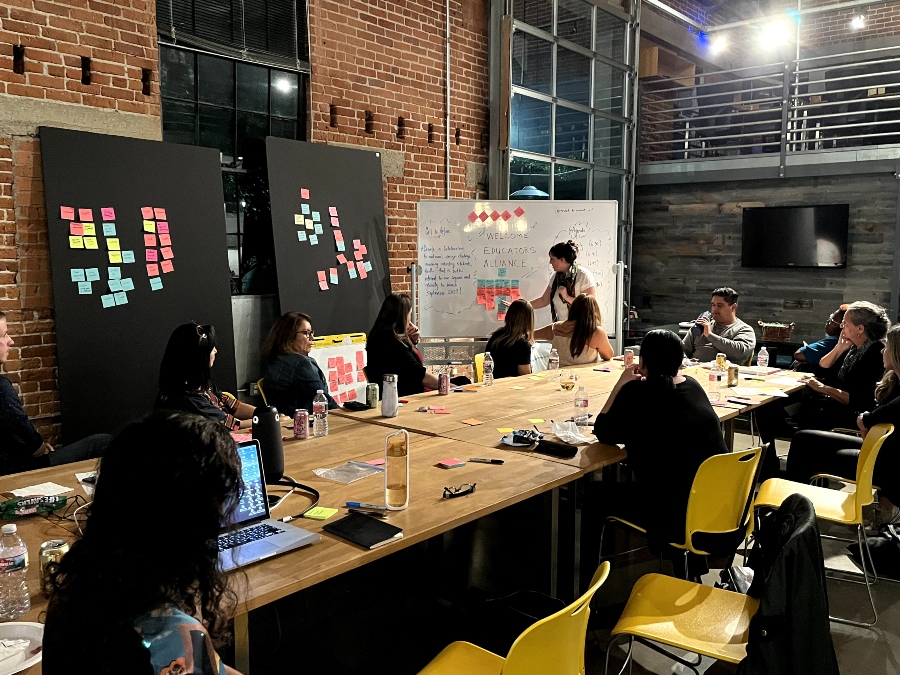Campus Transformation
The Design Lab’s work includes transformative changes to the institutional processes and physical environment of the university itself.

Junior Designers
The Junior Designer program is a paid, co-curricular record opportunity that provides undergraduate students from any major with opportunities for additional instruction and involvement in projects outside of the classroom. Because the program runs on cycles per academic year, it gives participants the opportunity to expand ideas beyond the 10-week quarter cycles of traditional instruction.
Participants must apply to the program in spring for acceptance in the fall quarter. The program is managed by design mentors who offer coaching and guidance along with instruction.
Program structure:
- Year 1 (mandatory): training and apprenticeship; Design 1 and Design 100must be completed by the end of Year 1
- Year 2 (mandatory): project work
- Years 3 and 4 (by separate application, after completing Years 1 and 2): project leadership
Recent example projects and tasks:
- World Design Capital Beyond Boundaries Conference: Junior Designers assisted with conference production, having the opportunity to see firsthand how major events are designed and produced. This conference featured a complex run of show with multiple tracks and several dozen VIPs, providing a variety of supporting roles in which junior designers learned and interacted with professionals from a variety of backgrounds.
- United Nations Foundation Youth Town Hall: junior designers contributed to survey design for this coordinated effort with the YMCA of San Diego County to investigate opinions from youth ages 15 - 30 on the kind of world they would like to see in the year 2100. Several hundred participants completed the survey.
- Program Redesign: When the Junior Designer program needed updates, who better to consult on the design than the users themselves? Seasoned junior designers helped staff refine the program structure and determine desired outcomes, leaving the program even stronger for the cohorts that will come after them.
Power, Privilege, and Ethical Response
As our society grapples with critical questions about civic and social justice, equity, and inclusion, the Design Lab has sponsored a series on Power, Privilege, and Ethical Responses (PPER). The series has primarily focused on addressing anti-racism, particularly in relation to the experiences of Black communities. Part of this initiative is a series of Studio Sessions, designed to share tools that address the experiences of our Black community, in hopes of bridging existing gaps between the historical precedent and current calls to action. These interactive sessions are intended to foster dialogue, nurturing communication, and self-reflection to build empathy and ethical responsibility among participants. Expert speakers address issues affecting Black communities, ranging from the structures of anti-Blackness and White fragility to voter suppression, education, the school-to-prison pipeline, environmental racism, and much more. Leadership and key team members: Michèle Morris, Emily Knapp, Eric Hekler, Camille Nebeker, Brian McInnis, Lilly Irani, Stephanie Sherman, Teenah Eco, and the Junior Designer team.
SPUR
The Scaling Paid Undergraduate Research (SPUR) initiative at UC San Diego is a groundbreaking program designed to expand and democratize research opportunities for undergraduate students. Spearheaded by The Design Lab, the initiative aims to integrate paid research positions across diverse academic disciplines, ensuring students from all backgrounds have equitable access to hands-on research experiences. By collaborating with faculty, industry partners, and university departments, SPUR fosters a vibrant research community that supports student innovation, enhances academic engagement, and prepares undergraduates for professional success. The program's success is highlighted through documented outcomes and impactful student projects, illustrating its transformative potential within the academic ecosystem. Leadership and key team members: Kevin Popović and the Junior Designer team.
